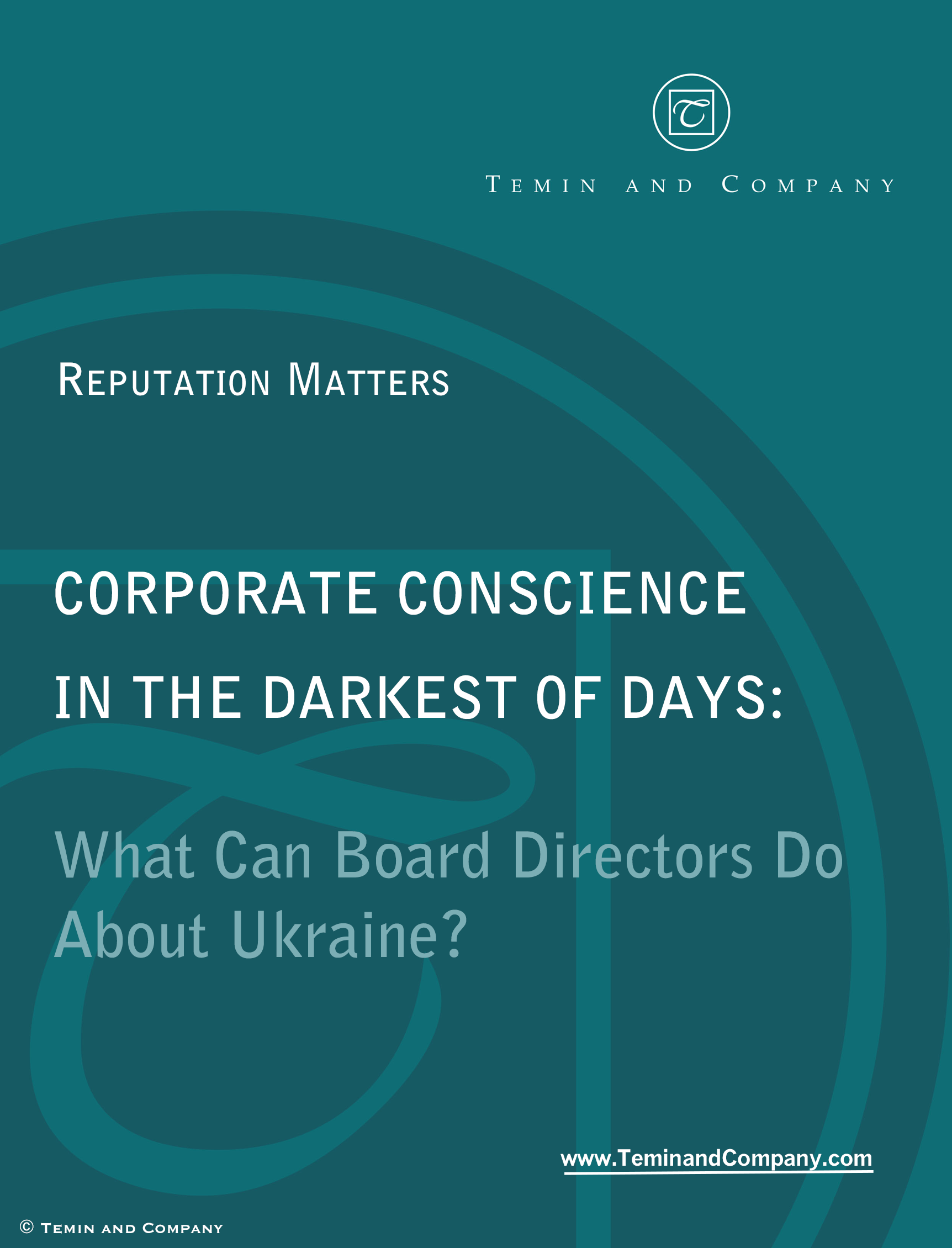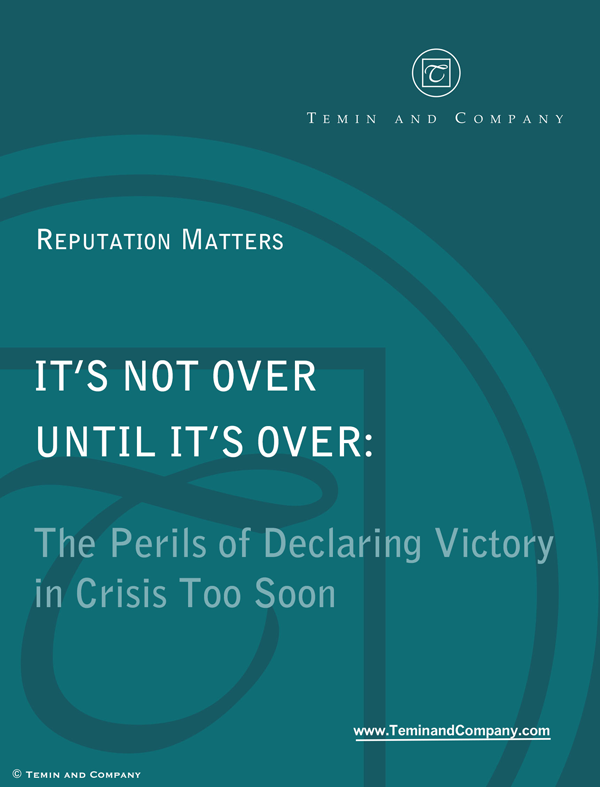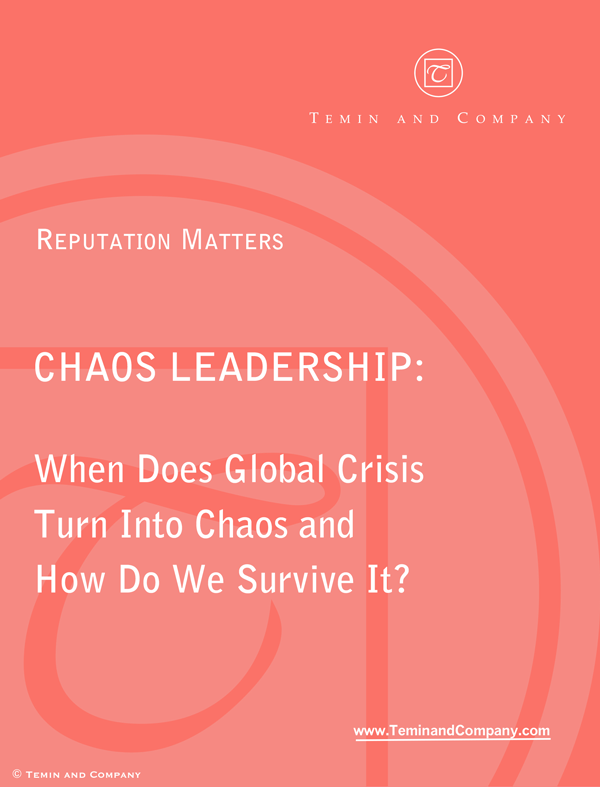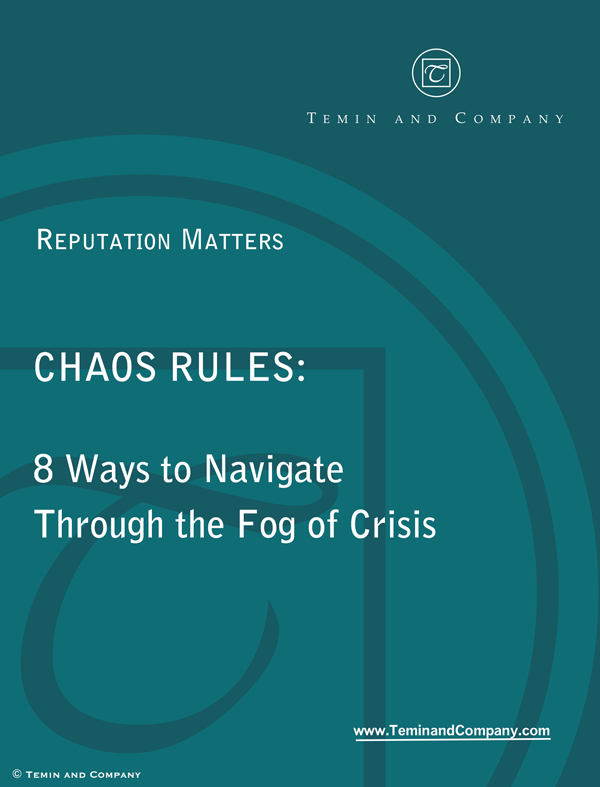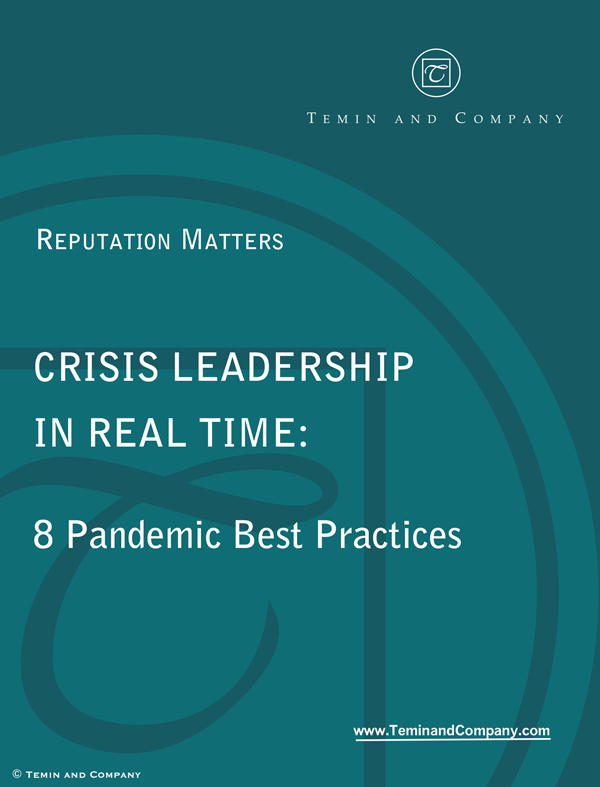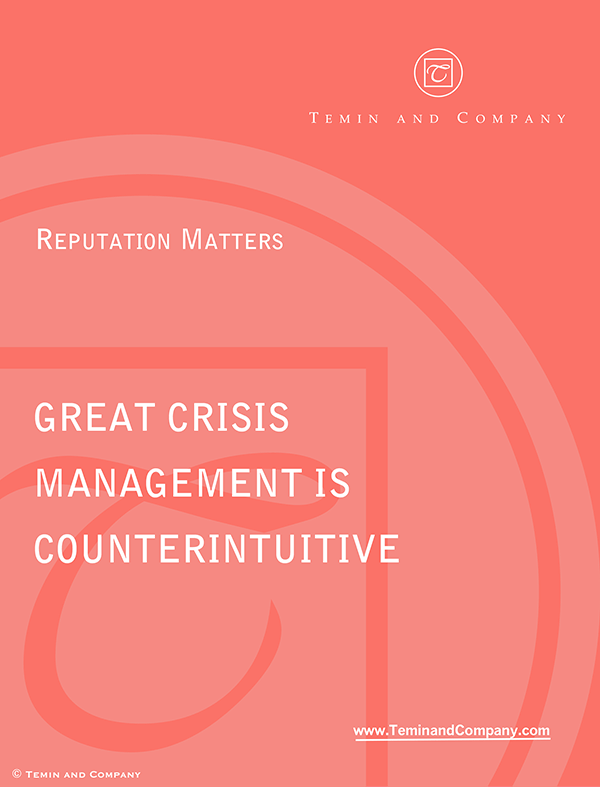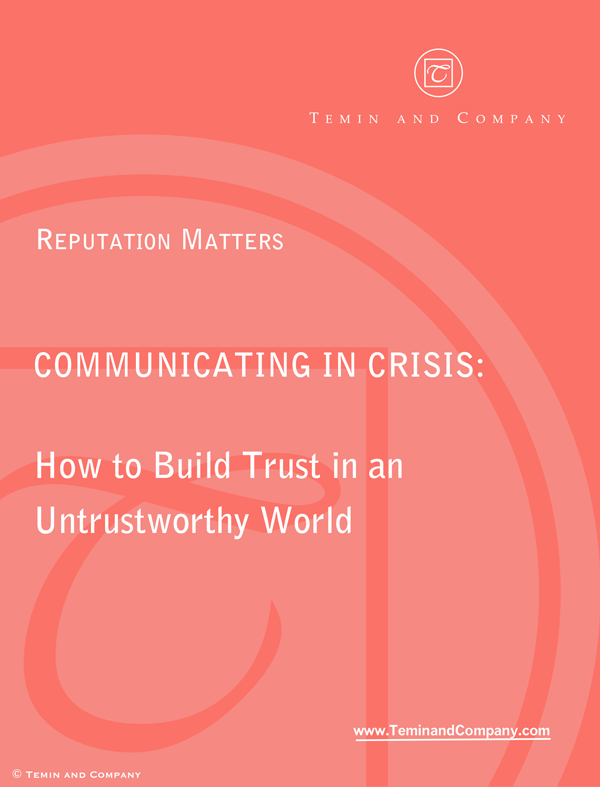Thought Leadership–Reputation Articles
White Papers»
"Reputation Matters" White Papers seek to offer deeper insight on a wide range of topics we help clients address.
When Is An Apology NOT An Apology? New Lessons From Abercrombie & Fitch
Leadership, “Reputation Matters” Forbes, May 17, 2013
You know when your spouse does something really bad, and knows he or she needs to apologize, but doesn’t really want to? And you know how the way he puts it is often something like: “Oh, dear, I’m so sorry that you feel that way” or “it’s too bad that you have gotten so upset”? And you know how you feel after he says it – even angrier still.
An apology that is not an apology is enraging. It takes no responsibility for the action that prompted the apology. It has no sense of mea culpa, or remorse, but rather seems to transfer the blame to you – sorry YOU got upset, not sorry that I did something to upset you. In a marriage, too many of those, and you are headed to divorce court. In a friendship, that way lays “unfriending.”
And so, here we go again. Given the groundswell of anger that has escalated since my last column on Abercrombie & Fitch on Monday the 13th , and the rebirth of its CEO’s incendiary comments in an interview in Salon 7 years ago on not wanting the un-thin, the un-young, or the un-beautiful to wear A&F clothes, finally the company realized that they had to do something. […read more]
Calling all Global CEOs — Have You Signed the UN Women’s Empowerment Principles Yet?
Leadership, “Reputation Matters” Forbes, March 11, 2013
The UN is putting its muscle behind changing the game for global women, and is asking companies around the world to follow suit.
There has been so much talk, but so little action – around women’s leadership, gender equality, and curtailing violence against women. This year, however, efforts seem to be more serious, possibly fueled on the humanitarian front by such horrendous examples of violence around the world, and on the business front by Catalyst’s latest report detailing just how badly women’s progress in business has stalled (for at least 7 years, on boards, in top leadership, and in the highest paying corporate jobs.) […read more]
What Makes Up a Reputation – and What Must Board Directors Know about Reputational Risk
Directors & Boards, September 4, 2012
Reputation is a hard concept to circle, but board directors know that it has become one of the biggest assets, or liabilities, a company has. Here, Davia Temin answers discusses how corporate boards must address risk in order to crisis-proof their boards. […read more]
What Boards Must Know About Social Media
Davia Temin, The Corporate Board, May/June 2012
Someone posts a harsh item about your company on Twitter. The comment is picked up and amplified through other online venues, and the company’s stock prices take a fall—all within hours. Today’s world of social media is one where the most obscure person, company or product can overnight become a global trend, or a global villain. Is your board aware of the company’s social media strategy? For that matter, are you as a director up to speed on the new social media world?
In this age of social media, companies of all kinds find themselves at the end of the “command and control” model of leadership. Top-down communications, including those from the C-suite and the boardroom, have lost their primacy.
Today, with blogs, v-logs, Twitter, Facebook, Pintrest and social media of all kinds, everyone has a voice. More to the point, anyone can move markets if his or her voice catches on with the public.
Employees have a voice—including the employee that management fired yesterday. Your “like’rs” have a voice; your dislikers have a voice too (including all of the “I hate xx company” websites, and Facebook-facilitated boycotts). Your competitors have a voice, your shareholders have a voice, and you, as board members, have a voice as well. However, amid the cacophony, it is now exponentially more difficult to make the messages you and your company wish to convey heard.
Especially for the board, knowing how to communicate in social media (and when it is or is not appropriate) is crucial. A board’s workings are historically private and confidential, and a board tends to be heard from only when announcing a new CEO or in a serious corporate crisis.
If you’d like to read the full article, please click here (pdf).»
Wall Street, Volatility, and Reputation
Davia Temin, Intangible Asset, May 4, 2012
Davia speaks about the importance of “intangible assets” such as trust and loyalty in brand building, specifically related to the financial crises and reputational crisis surrounding financial firms like Goldman Sachs.
If you’d like to listen to the broadcast, please contact us.»
Announcing CEO Illness — Best Practices from Buffett to Jobs
Davia Temin, Forbes, April 18, 2012
“It is probably much easier to announce your cancer diagnosis in a press release when it is only stage 1…” writes Davia Temin on her Forbes.com blog. […read more]
Flipping Out in Public – From Jet Blue Pilot to Kony 2012 Producer, Stress Takes Its Toll
Davia Temin, Forbes.com, March 29, 2012
Davia examines what the all external media stimulation we receive every day does to our inner selves in her Forbes.com article on stress taking its toll on people in 2012, specifically citing the recent, public meltdowns of the Kony 2012 producer and a JetBlue pilot. […read more]
How To Destroy A Reputation in Less Than A Week: Komen and Planned Parenthood
Reputation Matters, Forbes, February 3, 2012
“Politics and women’s health issues have always made strange bedfellows, but never more than in the past week.” In a bizarre series of actions, Susan G. Komen has alienated itself from Planned Parenthood. […read more]
Strategy, The One “Do” Amidst the Don’ts — Wrapping Up “The 10 Don’ts of Corporate Social Media” Series
Reputation Matters, Forbes, August 17, 2011
#11: “Strategy, The One ‘Do’ Amidst the Don’ts — Wrapping Up ‘The 10 Don’ts of Corporate Social Media’ Series”
Strategy, Strategy, Strategy – that is our prescription for corporations looking to enter or exist in the world of social media.
It is so very easy to enmesh your brand in the frantic social media activity of the moment; and it is so very easy to get off track, off-message, and, well, just plain off.
Whereas Boards, CEOs, CMOs and corporate marketers are fairly adept at judging and managing the value, efficacy and quality of conventional marketing and media strategies, because they are essentially uncertain about what is going on in social media they can be easily led astray. When you don’t know where you need to go, all roads will take you there.
When all bets are off, you do not know where to lay your money down.
And this is where strategy must come into play. […read more]
The 10 “Don’ts” of Corporate Social Media
Reputation Matters, Forbes, August 4, 2011
As social media continues to morph moment to moment – almost every corporation and enterprise knows it should be doing something to position itself, and its products and services, over social media. Yet most simply do not know what that something is, or how to do it effectively. Davia and Social Media Intern Ian Anderson write on the “10 Don’ts” of corporate social media, and give advice for some “do’s” along the way.
Our 10 Don’ts Of Corporate Social Media:
#1: Don’t Over-Market, Be Social
#2: Don’t Act Like a Robot; Show a Human Face
#3: Don’t Forget to Engage; Hold Conversations
#4:Don’t Seduce and Abandon, But Know When to Leave
#5: Don’t Let the Interns Handle Your [Entire] Social Media Presence
#6:Don’t Be Stupid; Be a Thought Leader
#7: Don’t Be Indiscreet or Illegal
#8: Don’t Be Afraid to Admit Mistakes
#9: Don’t Forget to Use Your Brand’s Network To Create Love from “Like”
#10:Don’t Forget to Leverage Your Community
White Papers»
"Reputation Matters" White Papers seek to offer deeper insight on a wide range of topics we help clients address.




